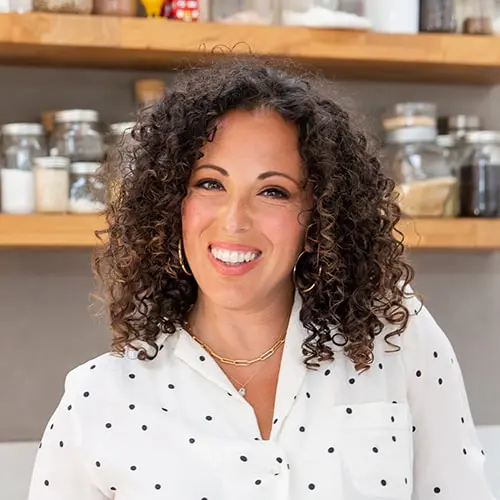If you have ulcerative colitis, this is a case study you’re going to want to read. It’s about a woman—I’ll call her Sherrie—who suffered from this condition for years—until we were able to make some real breakthroughs in her health.
Ulcerative colitis is a type of inflammatory bowel disease (IBD), a disorder that also includes Crohn’s disease. People who have ulcerative colitis have an inflamed colon and rectum and ulcers on the intestinal lining. Living with IBD can be a roller coaster. Their symptoms worsen during flare-ups and their symptoms go away during periods of remission.
Doesn’t sound like much fun, does it?
Ulcerative colitis is often hard to put into remission. It can take time to pin down and treat the root cause. But I’ve found that ulcerative colitis responds well to functional medicine. Often, we can send its bags packing—or at least put it into a long-term remission.
Such was the case for Sherrie.
Sherrie’s Long-Term Battle With Ulcerative Colitis
When Sherrie first came to see me in January 2018, she had been diagnosed with ulcerative colitis nine years prior at the age of 25. Before developing symptoms, she’d had a stressful few years. She bought a house, got married, was finishing her bachelor’s degree, and became pregnant for the first time.
After her initial diagnosis her symptoms were manageable for years. She responded well to the drugs offered her. Conventional doctors gave her prednisone and Lialda (mesalamine) to lower inflammation. Most of her ups and downs were during pregnancy when she had to get off her meds, and she’d get better when she went back on the drugs.
After her third child was born in 2013, she went into remission and didn’t need to take any UC medications for two to three years. Then she caught a cold while traveling and this turned into an ear infection. She took antibiotics, which led to a UC flare. In the two years before she contacted me, she never came out of the flare, which motivated her to seek my help.
Sherrie suffered from bloody stool and watery, urgent diarrhea six to ten times per day. She couldn’t leave her house for fear of not being near a bathroom when she had to go.
She’d never been hospitalized, but the poor dear had only been in remission for a brief period since giving birth, she told me. Pregnancy and birth can cause an immune shift and had made her ulcerative colitis even more difficult to control.
The lab work ordered by other doctors found:
- Low iron and ferritin
- Low vitamin D
- Low potassium
- Low hemoglobin (she was anemic from blood loss)
- Monocytes and eosinophils very high (suggests a parasitic or other type of infection.)
When she first came to my clinic, she was already on a strict paleo diet. That by itself didn’t do any good.
Treating Stress Hormone Imbalances
The first step? Treating Sherrie’s stress-response system. The hypothalamic-pituitary-adrenal axis (or HPA axis) regulates our circadian rhythm and our stress response. Chronic stress can really throw the HPA axis out of balance, which leads to hormone imbalances. It can cause the adrenal glands to pump out too much of the stress hormone cortisol. Some people call this “adrenal fatigue,” but it’s really a problem with the entire HPA axis.
As Sherrie tapered off the prednisone, I gave her a higher than normal dose of dehydroepiandrosterone (DHEA), a hormone produced by the adrenal glands. Because she had been under stress, her adrenal glands were likely worn out and weren’t making enough DHEA.
In fact, every ulcerative colitis patient I’ve treated has had HPA axis dysregulation. So I typically always address this in my UC patients.
And guess what? Her ulcerative colitis flare regressed for the first time in two years. She now had only minimal rectal bleeding and not every day.
Candida and Intestinal Bugs
While dealing with Sherrie’s adrenals, I ordered a stool test that revealed she had high levels of the following bacteria and fungus:
- Candida
- Klebsiella
- Prevotella
- Proteus
- Pseudomonas
- Salmonella
- Staphylococcus
- Streptococcus
It didn’t surprise me that she had Candida overgrowth. The fact she had gotten worse after taking antibiotics for her ear infection was a BIG clue that fungal overgrowth played a role. Candida is a type of yeast that under the wrong conditions can turn into an invasive fungus in your body.
Plus, we know from studies that almost all cases of ulcerative colitis involve the marriage between a fungal imbalance and a bacteria that either trigger immune dysfunction or worsen it.
In mouse studies, Candida albicans can worsen inflammatory colitis. What’s more, the yeast Candida tropicalis teams up with certain bacteria like E. coli to form a monstrous biofilm larger than any created by just one or two of the species alone. A biofilm is a type of shield that bacteria and fungi can form to protect them from things like antibiotics.
The stool test also detected the presence of an amoeba parasite known as Entamoeba coli. Although many people with this parasite don’t have any symptoms, high amounts are linked to loose stools, gas, and other GI complaints. Amoeba infections in general are also linked to IBD.
Sherrie’s stool test also showed high levels of calprotectin, which is a marker of inflammation in the gut lining. A high calprotectin is a red flag for IBD. Her levels of secretory IgA (SIgA) were also high. SIgA lines your intestines and acts as a gatekeeper, keeping bacteria, parasites, and allergens out of your circulation.
Fancy Footwork and Ulcerative Colitis
I began treating the parasitic infection, balancing the microbes in the intestines, and starting round one of Candida treatment. However, we had to put the brakes on treating the Candida for a little while because before starting treatment for this fungus, Sherrie went into flare mode.
There’s often a lot of fancy footwork needed to treat ulcerative colitis patients. Flares can happen due to stress, seasonal changes, and other reasons. We need to time treatments so that we’re not putting too much stress on the body during flares.
Other issues that showed up in testing also needed attention. For example, her mitochondria—the powerhouses of the cells—were in trouble. This is likely because the Candida produced ammonia and acetaldehyde, both toxins to the mitochondria. She also had high levels of a damaging process known as oxidative stress due to the autoimmune process that had created a years-long raging fire in her body.
Her glutathione levels had also tanked, so her body wasn’t making enough of this antioxidant to fight the oxidative stress. I included liposomal glutathione into her regimen.
Here are some other strategies that worked:
- Adding low-dose naltrexone, an anti-inflammatory drug shown to reduce symptom severity in IBD
- Eating an anti-inflammatory diet and adding in foods like rice and some dairy
- Gut-focused hypnotherapy for her post-traumatic stress disorder (PTSD) response when getting into her car. This was triggered by the fear of needing to poop and not being near a bathroom. This therapy and the progress we were making allowed her to travel far from home.
Big Improvements in Ulcerative Colitis Symptoms, But More to Go
By August 2018, Sherrie was the best she’d been in two years!
In September 2018, I ordered another stool test and some other lab work. Some of her beneficial gut bacteria were low and her calprotectin levels were still high. At the same time, I ordered a food reactivity test. Based on that, I had her avoid eggs, wheat, lentils, peas, cashews, peanuts, tuna, and a few other foods.
Her worst flares tended to happen between Thanksgiving and Christmas. My theory? Holiday stress combined with lack of sun and vitamin D contributed to these flares. I learned to give her proactive support heading into that time of year.
Finally, for the first time, she was able to go through the holidays with only a minor flare. I gave her a Chinese herbal formula known as Yunnan Paiyao, which stopped the flare in three days. The Chinese herbs also firmed up her stool.
In addition, I gave her pre- and probiotics and improved her detoxification and antioxidant levels.
Ultimately, after a period of three steps forward and two steps back, she was able to endure the holidays with zero flares.
By January through May 2019, she was better overall and her stool consistency improved, but she was still bleeding mildly.
So much progress, but there was still a root cause that had not been addressed. At this point, I ordered more testing, including a stool test that found the amoeba parasite Blastocystis. The testing also revealed problems digesting and using fats, so I had her take ox bile and a few other supplements.
What’s more, her zinc levels were low. Zinc is critical for bowel repair and lowering inflammation. Selenium—a mineral critical for autoimmune health and the production of glutathione—was also low.
The testing showed her oxidative stress levels were high and her detox abilities were overwhelmed. Levels of the antioxidant glutathione were better, but still low. She still had some Candida.
How To Stop An Ulcerative Colitis Flare-up
In July 2019, after a stressful event, Sherrie went into another flare. I put her on the Specific Carbohydrate Diet (SCD), a diet that’s free of sugar, grains, starch, and processed foods, which really helped. Butyrate enemas were also helpful. Butyrate is a short-chain fatty acid formed from the fermentation of dietary fiber in the colon. It is the main fuel the cells of our intestinal lining use for repair, and it is known to reduce ulcerative colitis symptoms.
Even before our next appointment, as soon as Sherrie could feel a flare coming on, she immediately followed my advice for reducing a flare. It was a BIG win! She was learning how to manage and stop flares on her own. The flare stopped by August and by the fall she was the best she’d been in four years.
She had another flare at the end of summer triggered by poison ivy while camping, but she was able to stop it within two to three days.
By fall she was feeling amazing. She was having regular, twice daily bowel movements. There was no urgency and the stool was well-formed. At the same time, Sherrie was finishing round two of the Candida program.
From fall of 2019 to January 2020, Sherrie stayed in remission. Right after the holidays were over she had another flare, but she was able to stop the flare almost entirely on her own before our next appointment. Yay!
We tested again. As you can see, this is a process of continually testing, treating, and modifying the protocol until we can get ahead of the disease process. Since her vitamin D levels were very low, I gave her a higher dose supplement. Her gut microbiome was also imbalanced with low levels of a type of bacteria known as Akkermansia. I focused on restoring levels of this important bacteria using specific prebiotics (pomegranate seed husk, matcha, greens powders, red powders for polyphenols, and acacia fiber) in order to repair her gut lining.
She had only a mild flare in the winter of 2019-2020. This happened in February 2020 and drew out with occasional small amounts of blood until April.
Can Mold Toxicity Cause Ulcerative Colitis?
After the flare in February 2020, we discussed some reasons why she kept having flares—and we had a breakthrough.
I knew that there is a link between mycotoxins—toxins produced by mold—and ulcerative colitis. When no obvious lifestyle or nutrition factors could explain Sherrie’s UC flares, I started digging deeper into what might be bothering her in her environment- her house to be exact. The fact she got worse in winter when the environment was more moist also pointed toward mycotoxins as a possible cause.
Even though her home was a new build she knew for certain there was periodically mold in her home. She and her husband often tried to clean it up.
We tested Sherrie for mold and mycotoxins in April 2020. Many markers for mycotoxins were high. An inflammatory marker known as TNF-alpha was also elevated.
Aha! Mold could definitely be the culprit.
She had her home inspected by a professional company that uses indoor mold testing and found the home was contaminated.
I started Sherrie on a treatment regimen for mycotoxins in July 2020 to proactively get her through her vulnerable period in late fall/winter.
At first that strategy paid off. She felt great. Her stool was firm and she had no flares.
She took a break from the mycotoxin program and had a flare between Christmas and New Year’s 2021. She mostly recovered within a month. But since she was still having flares, I decided to retest her for mycotoxin markers in February 2021.
That testing revealed she still had very high levels of the mycotoxin known as ochratoxin. Although these tests aren’t always 100% accurate, Sherrie’s lack of complete progress, her symptoms, and other markers suggested mold could be to blame.
I put her on another round of the mold protocol, and she stayed well through August 2021.
I ordered another mycotoxin test and it was much lower, although still high. This suggested she might be getting re-exposed.
Her husband had done some mold remediation on their home. But another round of indoor mold testing still showed the mold was off-the-charts positive. A mold-testing company found more mold in the utility room behind the water heater, in the shower caulking, and in the air.
They had their home professionally remediated.
I then put Sherrie on another round of mold treatment.
She had COVID-19 in November 2021 but did not experience a UC flare even though her body was under stress from the virus. This showed her intestines were getting stronger.
Stopping Ulcerative Colitis in Its Tracks: Success at Last!
Sherrie had no UC flares through the winter of 2021—the first winter with no flares in nine years. Over the course of treatment, Sherrie would have long periods up to a year with no bleeding, but she might develop loose stools with blood for a few weeks and then go back into remission. But by 2022, she had gone a very long time with no visible blood in her stools. Now we were getting somewhere!
Her mold test came out clear. She felt great—high energy, no anxiety, and able to travel a lot in the winter and spring without fear.
At this point, I put her on a long-term program featuring antioxidants and pre- and probiotics. She’s taking minimal supplements and doing well.
Sherrie’s case shows that ulcerative colitis and inflammatory bowel disease respond well to a functional medicine approach. In IBD, there are many overlapping root causes that must be identified, treated, and modified, all the while working around a person’s flare-ups. Over time, Sherrie and I figured out her triggers and she learned the tools to stop her flares before they started. It may take some time, but ultimately a functional medicine practitioner can dig down to the root problem in order to heal ulcerative colitis.
Heal Ulcerative Colitis with Functional Medicine
Like Sherrie, you can heal ulcerative colitis by working with a functional medicine practitioner. That’s why I invite you to reach out to me for a free 15-minute troubleshooting call to find out the best course of action for you.
If after the call you come on board as a patient, I’ll order the right tests for you and start you on an anti-inflammatory protocol. The goal is to pinpoint your individual triggers and put ulcerative colitis in remission or cure ulcerative colitis altogether.
At the Reverse-Age Method, we believe in a holistic approach to perimenopause and beyond, that addresses the root causes of your symptoms (like insomnia, hot flashes, night sweats, erratic periods, fatigue, skin aging, weight gain, and brain fog)– to also slow the pace that your cells are aging. Whether it’s improving gut health, optimizing detox function, enhancing mitochondrial function, or building muscle mass, our comprehensive program has got you covered.
If you’re new here, be sure to check out our Blog Page for more insights and tips on how to thrive during perimenopause. Our blog is packed with practical advice, success stories, and the latest research to help you on your journey.
For more updates and community support, follow us on social media:
You May Also Like...
The Real Cause of Premature Aging and Dull Skin
I’m not afraid to admit... I'm obsessed with good skin. After my work is done for the day and my daughter is asleep,…
Recipe: Nourishing Water Kefir Jello
Want a recipe that’s nourishing for your gut, skin, hair, and nails… but also really delicious and fun to eat? (I’m…
Whether you’re looking for help with your gut, your hormones, or both, our team of practitioners work together to treat the WHOLE you – guiding you to a healthier mind, body, and spirit day by day.



